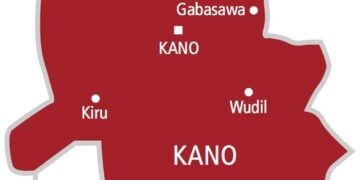The proposed National Commission for Technology Transfer, Promotion, and Acquisition intends to leverage Nigeria’s huge and active population to create jobs for the youths, process raw materials into finished goods/products, increase Gross Domestic Product (GDP) and transfer technology to the country.
The proposal is contained in the National Commission for Technology Transfer, Promotion, and Acquisition (Establishment) Bill 2023 which has passed through second reading in the House of Representatives.
Sponsored by the member representing Abak/Etim Ekpo/Ika federal constituency of Akwa Ibom State, Hon. Clement Jimbo, the bill seeks to create sustainable jobs for the teeming youths and jerk up Nigeria’s GDP and increase its revenue base through foreign exchange.
The bill’s target vis-a-vis the commission is the production of batteries, the major component of which is lithium, a solid mineral found in large quantities in the country.
According to the National Bureau of Statistics (NBS), over 200 million cell phone, 500,000 solar systems, 12 million cars, millions of cameras, microphones, laptops and remote controls are currently in use in Nigeria and they depend on batteries made from lithium.
Sponsor of the bill, quoted a German foreign broadcasting company, Deutsche Welle to have said lithium had been discovered in large quantities in Nigeria, particularly in Abuja, Nasarawa, Kogi, Ekiti, Kwara and Cross River states.
Speaking with journalists in Abuja, Jimbo said the bill for technology transfer was borne out of patriotism- the love for one’s country “by leveraging on the vibrant population to attract what we do not have to complement with what we have.”
He said the over 200 million handsets used every day in the country have batteries as their component, which could be produced in Nigeria using lithium, and that would, in turn, create jobs and boost the economy.
“If a country wants to shift in a billion copies of handset, we’ll tell them it is a good idea but we are not just going to be a consuming nation of what you are producing in your own country. We must produce a component of that device in our country because we have the raw materials.
“So we will tell them, your product will not get into Nigeria’s market, except we produce a component of what you are shifting in. You produce a billion copy of handsets, we produce a billion copy of batteries via the technology that you deliberately, intentionally sold to us in exchange for our consumption power.
“You are shifting the billion copy handsets into Nigeria, we are shifting a billion copy batteries to you. You sell your handset to us, maybe at $5, we sell it to you at $1. So there is a transfer of technology. There is an additional value to our raw material. There is employment created and it adds value to our gross domestic product,” Jimbo said.
On the prevalence of lithium in the country, he said, “Right now in Nasarawa state 4,000 metric tons of lithium is being mined every day, shifted in its raw form outside the shores of Nigeria, process, then shipped the finished product to us to consume the same thing you have with petroleum.
“We have the crude. The crude is shipped outside, refined it, then brought it back for us to consume. What is happening with us? So, let’s just be frank. If Nigerians want this country to develop, I give us one year. We will fix this country by us.”
The lawmaker explained that if the bill is passed, assented into law and enforced by the executive no car will be imported into Nigeria with a battery as the car manufacturers will “sell to us or give us the specification of the quality of battery they need to function in that car. Then we will produce it here.”
“It also means that by next year, I am sure iPhone 15 or 16 is already out. By next year, whether it is 17 that will come out, it will not enter this country without us producing the battery. And so many laptops that are battery operated, cameras, microphone that uses batteries, all those battery specifications will be produced here.
“The company will send to us what they need and they will equip us with the technology, possibly come and site your factory here and produce it here, just to add value to our raw materials. Just imagine what that would do to Nigerians.
“The 12 million cars we currently have in Nigeria means we will be producing a minimum of 12 million batteries, maybe every quarter. I’m not even talking about cell phones. Is it solar renewable energy? So the benefit is uncountable. And this is what we need. We just need one law to be operational and effective. It will revolutionise the entire thing.
“We are telling them, come and set up your business here. A thriving business that you have the product and you have the market. We are using our strong point, our market, to make sure we get what we want. Simple. And if you don’t like our market, you don’t want us, you don’t want to develop our product here, then don’t produce it outside and just dump it on us.”
Jimbo said he had met with the minister of Solid Minerals, Dele Alake who is a major stakeholder as far as the bill is concerned and he agreed completely with the legislation and its intendment.
“In fact, he told me that the government is also thinking in that direction. In fact, when the president commissioned the lithium factory in Nasarawa State, he appealed to the company. He said, look, don’t just take this thing away. Come and set up here, manufacture it here. You make your money, not just for Nigeria, but for the entire West Africa.
“But of course, stuff like that cannot just be at the whims and caprices of who becomes a president or the minister. If there is a legal framework, it will attract companies. Who knows that if they set up their factory, produce it here, there is a law that protects them, that maybe the next president that comes in will not just open up the borders for stuff to come in.
“So that is the advantage of having this legal framework in place to even protect companies that want to set up their factories here, produce the materials here, and sell it to us and other nations.
“The moment this bill is passed into law, it repeals automatically NOTAP Act 2004. And if you look at their core objectives, it’s just to monitor the inflow of technology into Nigeria. That’s simply monitoring. Just sit down and things are passing. You are just monitoring. Of what benefit is that to Nigeria?
“But this one is coming to strengthen their responsibilities by making sure, look, this technology, if it cannot add value to our raw materials, let it not come in. So, it is not a duplication of agency. The office is already there. The staff are already there. We are simply telling them in addition to what you’ve been monitoring, filter it.
“If we can produce it here, let it be produced here and don’t allow it to come into our country. Let’s protect our industry. Otherwise, threatening the agency to be monitored. Whoever that is there should not jitter. It is still going to be there with additional responsibility.
“I am not going to be the DG of Commission Technology Transfers. I’m already a lawmaker. But I’m only adding value to what they have already in order to reduce our unemployment rate, add value to our gross domestic product, and get our people off the streets.
Imagine if all the batteries we consume in Nigeria are produced in Nigeria. It will make sense. International trade laws have been taken into consideration.”





